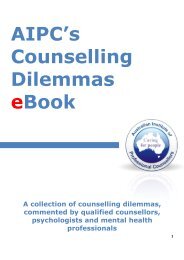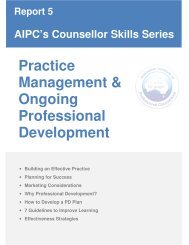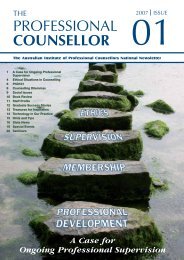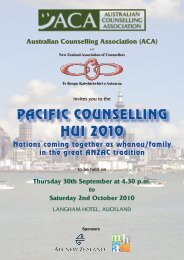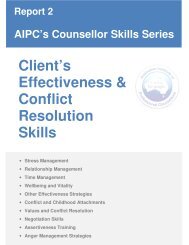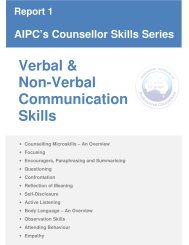Why Diversity? - Counselling Connection
Why Diversity? - Counselling Connection
Why Diversity? - Counselling Connection
- No tags were found...
Create successful ePaper yourself
Turn your PDF publications into a flip-book with our unique Google optimized e-Paper software.
AIPC’s Counsellor Skills Series, Report 3• Your client may also experience cognitive dissonance which occurs when problembehaviours arise as a manifestation of a conflict between their familial culture and theculture in which they now live.An effective counsellor must be sensitive, resourceful, perceptive and imaginative. Aneffective multicultural counsellor must obey the following rules:1. Respect people's choices. What may be acceptable to one person may be culturallyinappropriate for another.2. Learn from your clients.3. Develop a culturally sensitive approach to all your clients, even if they do not comefrom diverse backgrounds. Avoid working within a cultural stereotype, and if you donot understand something - ask.4. The most effective technique will be one that acknowledges the values and beliefs ofyour client's culture.Case Study - IntroductionIt is important to keep in mind that the following scenario is only one of a multitude ofpossibilities. It is useful to illustrate how the theory behind Professional <strong>Counselling</strong> can beemployed to help clients from a range of cultural backgrounds.Lin and Han recently moved from Vietnam to Australia so Han could work as a GeneralPractitioner. He has been working as a doctor in Vietnam for over five years but hisqualification was not recognised by Australian authorities and he must complete a two yearretraining course. Lin had worked for her family's jewellery business and now must work twojobs to help support Han while he studies. Both Lin and Han came from large, extendedfamilies. They have been married for three years.Lin and Han have now been in Australia for six months and have been having difficulties intheir relationship. They are living in a small apartment near the university where Han studies.Although they are friendly with their neighbours, they do not socialise much with thembecause they are considerably younger than themselves. Han and Lin have come to see acounsellor in the hope they can work through some of their problems.Essential Case InformationLin feels that Han has abandoned her and spends too much time at the university. She feelsthat he does not prioritise her and he only cares about his study. She is very lonely and tired.Lin works two jobs during the week but does not feel attached to any of her co-workers. Shefeels something is missing from her life and that Han should be more supportive.On the other hand, Han feels that he is working hard at university so that he will be awardedhis qualification and be able to provide for Lin. Han believes Lin is being too clingy and overprotective,constantly asking him to stay at home and spend time with her. In Vietnam shewas very independent. Han says that he has many goals to achieve and wishes Lin wouldbe more supportive of his studies.He also believes that Lin is selling herself short by working at a newsagency and at a bakeryon the weekends. He says that Lin used to manage the family's business and she has thequalifications and experience to find a similar job in Australia.Page 32



